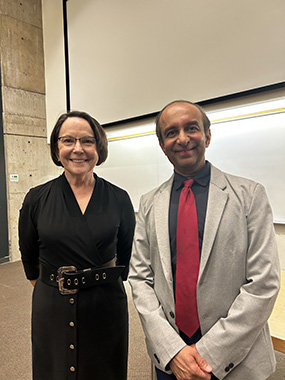» Go to news main
New bursary supports students with dyslexia at Dal

Isaac MacDonald learned differently than many of his fellow computer science peers at Dal due to his dyslexia, but that didn’t sap his enthusiasm and motivation for the subject.
 Dr. Srini Sampalli, who taught Isaac during the 2017-2018 academic year, remembers him as a student who excitedly took on assignments and attended every class full of ideas.
Dr. Srini Sampalli, who taught Isaac during the 2017-2018 academic year, remembers him as a student who excitedly took on assignments and attended every class full of ideas.
“To him, his major accomplishments were not in the marks that he received, but in the aha moments that you have when you learn a concept,” explained Dr. Sampalli at an event earlier this month celebrating the launch of a new bursary in Isaac’s name for students with dyslexia.
Dyslexia affects a person’s ability to read and write. Letters can appear differently on the page, making written language hard to comprehend and articulate.
Jane MacDonald, Isaac’s mother (shown right with Dr. Sampalli), and her family pledged the initial funds and worked with the Dalhousie Student Union (DSU) to establish the bursary. She says her aim is to honour Isaac’s memory and further the goals he set out for his own career, which were to develop educational software to increase access to learning for those with dyslexia.
After their first meetings, the DSU decided to match the MacDonalds's pledge and an annual amount of $3,000 was decided for the bursary.
Students can apply via the Registrar's Office as part of the broader Dalhousie Undergraduate Bursary Application available on Dal Online. Any student who self-identifies on the application as having dyslexia will be eligible for this bursary.
Challenges of dyslexia
Despite being an eager learner, Jane says Isaac had significant challenges with reading and printing from his earliest days in school.
“First day of Grade One — before we left the house — Isaac turned to me, he was beaming, and he said, ‘Mom, I’m going to learn to read and write!’” she remembered. “He had plans, he was going to write books. But Isaac wasn’t learning to read and print in grade one — not at all.”
At the end of that school year, Jane took him to see Dr. Joan Backman for an educational assessment.
“Although Isaac was only six and too young to be diagnosed with a learning disability, that assessment was so important. I took the results and Dr. Backman’s recommendations to the school, and they were terrific,” Jane recalled. “From Grade Two on, Isaac had targeted special ed.”
A later assessment confirmed that Isaac had a severe learning disability, though he rejected the term “learning disability” in favour of “learning differences.”
Dr. Backman, a psychologist specializing in the neuropsychological, spoke about the challenges students with dyslexia face.
“Beginning readers have to decipher symbols on a page, and for most children breaking that code comes quite naturally,” she said. “But for others, like Isaac, really figuring out the phonological awareness of how words are broken down into sounds, learning how to convert letters to language really remains a mystery. They have a hard time learning to sound out words and they often rely on guessing at words or on context and picture cues, and partial letter cues.”
A helping hand
For many, however, a psycho-educational assessment like the one Dr. Backman provides is out of reach financially, leaving some children to grow up facing barriers without the right accommodations, helpful technology, or special education.
Jen Davis, manager of the Dalhousie Student Accessibility Centre, shared some insight into the barriers faced by students with disabilities at Dal.
“Those of us who work with students with disabilities, or are students with disabilities, know that there are a lot of barriers sort of built right into the system that are hard to overcome, and one of those is financial,” she said.
Davis said students with disabilities come from all over and face different barriers within the system. The Isaac MacDonald Memorial Bursary for Students with Dyslexia will provide a way for students to gain access to funding for psychoeducational assessments as well, even if the student is without a formal diagnosis.
“There are lots of requirements around funding, and a lot of them are very specifically not made for assessments, and yet a lot of students come to us without having an assessment, or having something that is so old, sometimes not in English or a language that any of us speak,” Davis said. “The ability to use the bursary funding to seek those assessments is an extraordinary thing for our students.”
For Dr. Sampalli, the experience of teaching Isaac proved eye-opening.
“It was me who learned more than what I was able to teach Isaac,” Dr. Sampalli said. “Isaac actually opened my eyes to the needs of students with diverse learning styles.”
Need to know
Fall 2024 bursary application will be open Aug. 23 - Oct. 15, 2024. If you are a Dal student and would like more information on how to apply for the bursary, click here.
If you'd like to contribute to the bursary fund, you can do so here.
Recent News
- Ridwan Oladipupo's Articipay
- Calling all gamers: develop your own video game at Global Game Jam 2025
- Computer Science student’s startup promises to make driving safer
- Future alumni: Seif Elbayomi
- Computer Science alum says mentorship is a powerful tool
- Protecting our health, oceans, and future: Dal innovators celebrated at 22nd annual Discovery Awards
- Dal researcher is making smart home devices safer
- Tech triumph: Dalhousie wins big at 2024 Digital Nova Scotia awards
